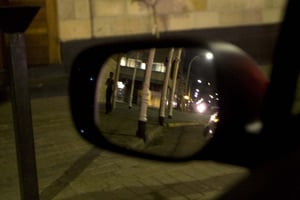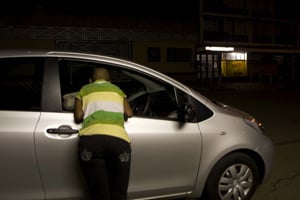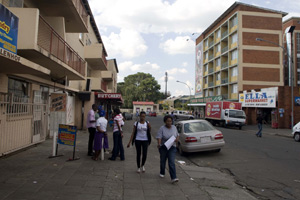Driving around Bloemfontein trying to find our hotel, we slowed our car just after an intersection so we could scan the street signs. A young woman stepped out from the shadows, approached the car and said she was ready to “play” with us for a minimum of R50.
We had arrived in the city just after 1am on Wednesday last week.

We told Dianne* we were journalists working on a story about human trafficking in the area.
She said she had been born in Durban, but, despite our assurances of anonymity, would not say whether she worked for a Nigerian pimp. However, she offered to introduce us to a fellow sex worker who might be willing to talk.
She took us to Noxolo*, a slim 24-year-old woman dressed in skinny jeans and a T-shirt. She worked for a Nigerian pimp, she said, and Dianne worked for him too.
Born in Bloemfontein, she had been lured into working for her current pimp by Batista, her Nigerian ex-boyfriend. She dated him for a while before he passed her on to her boss, whom she wouldn’t name. Soon afterwards Batista disappeared.
Noxolo had never worked as a sex worker until she met her Nigerian handler. “When I go home he expects me to have money with me. If I don’t bring money he will beat me up,” she said.
She admits to being a frequent user of rock — a cheap but potent hybrid of cocaine and chemicals that forms crystals which are burned and inhaled. Noxolo recently tried to clean herself up and went to a rehabilitation centre.
“I ran away two weeks ago,” she said, as we drove around the city. “I am addicted to drugs. I am dependent on him [her pimp].
“Most of the girls you see on the streets work for the Nigerians,” she said in a melancholy and unsteady tone; she appeared to be high.
On busy nights she can make as much as R800, but her pimp expects her to hand over every rand she earns.
“They have seen me in the car and they know I have money. I don’t know how this will end,” she said.
Minutes into our conversation, she suddenly begged us to stop the interview, saying her handlers were watching her. She pointed out two men standing impassively at an intersection a distance away, watching us. “I don’t want to do this any more,” she said.
When we stopped the car to let her out, we spotted a police van. Noxolo reassured us — the cops wouldn’t bother us — and she was right.
The girl’s stories reflected a pattern of young women being lured into the trade, but we found little evidence of human trafficking as such.
Driving around the outskirts of the city the next day, we saw a young woman waltzing along the side of the busy road making suggestive hand gestures at passing cars.
Thandi* was controlled by a Nigerian handler for a week. “I know it [the Nigerian-controlled sex industry in Bloemfontein] and was part of it,” she told us.
She said she was 19 years old but her weather-beaten face made her look closer to 30.
After only a week she fled from her handler: “They [the Nigerians] beat us up. It was tough. We were expected to bring back R500.”
Now she can’t risk working in the city centre where she could bump into him.

How had she found herself working for the Nigerians? A friend had asked her if she was interested in meeting a possible boyfriend, she said. A relationship ensued, but a few days into it, her “boyfriend” ordered her to go out for the day and “bring back her earnings”.
She made up to R800 a day. With that her boyfriend “bought me cheap clothes for me to look presentable”.
Leaving the Nigerians had distinct disadvantages, she said. “I don’t work at night. Competition is stiff and you get mugged. But if you work for them they protect you,” she said.
“All I am asking is for the government to arrest the pimps. They are causing us trouble,” she said — and then abruptly walked away.
Syndicates not to blame, say police
Bloemfontein’s human trafficking operations are not controlled by Nigerian syndicates, police spokesperson Superintendent Annelie Wrensch told the Mail & Guardian this week. It is “casuals” and “individuals” who lure young girls into prostitution with the promise of jobs.
Wrensch was responding to Free State Premier Ace Magashule’s assertion in his state of the province address two weeks ago that Bloemfontein police had identified a “trafficking ring” that runs brothels in the city’s old buildings and uses minors as prostitutes.
Notorious buildings in the city include Belmar Court on Peet Avenue, Judith Court on St George Street, the Saunders Building on West Burger Street and Cecilia Court on Cromwell Road.
Magashule said his administration was considering demolishing some of these buildings.
“We are working very closely with the law enforcement agencies,” said Wisani Ngobeni, the chief director of communications in the premier’s office.
In a raid last week the police arrested two Nigerians in possession of crack cocaine worth more than R1 000. Police also removed a girl “who looked suspiciously young” to have her age determined. In the past month alone eight young girls have been rescued and given bursaries to go to school. Another three have been sent to drug rehabilitation centres.

Last month Magashule accompanied police on raids.
“I found girls locked up in one room and they said they came from Pretoria. I immediately called their parents, who told me their children had been offered jobs in Bloemfontein,” The Times reported last week.
Wrensch could not estimate the extent of human trafficking in the Free State capital but said: “When we go on raids we find underage prostitutes.”
“[Prostitution] is still illegal,” Wrensch said, “and we’ll police it until it’s decriminalised.”
But sometimes the police’s attempts to do so are ineffective, she said because it “is difficult to convict suspects as you have to catch them in the act. So we deter people by warning them.”

With hundreds of thousands of visitors expected at the Fifa World Cup in June, rights organisations expressed fears that human trafficking syndicates will flood South Africa with women and children for prostitution, which will lead to an unprecedented escalation of the sex industry.
* Not their real names